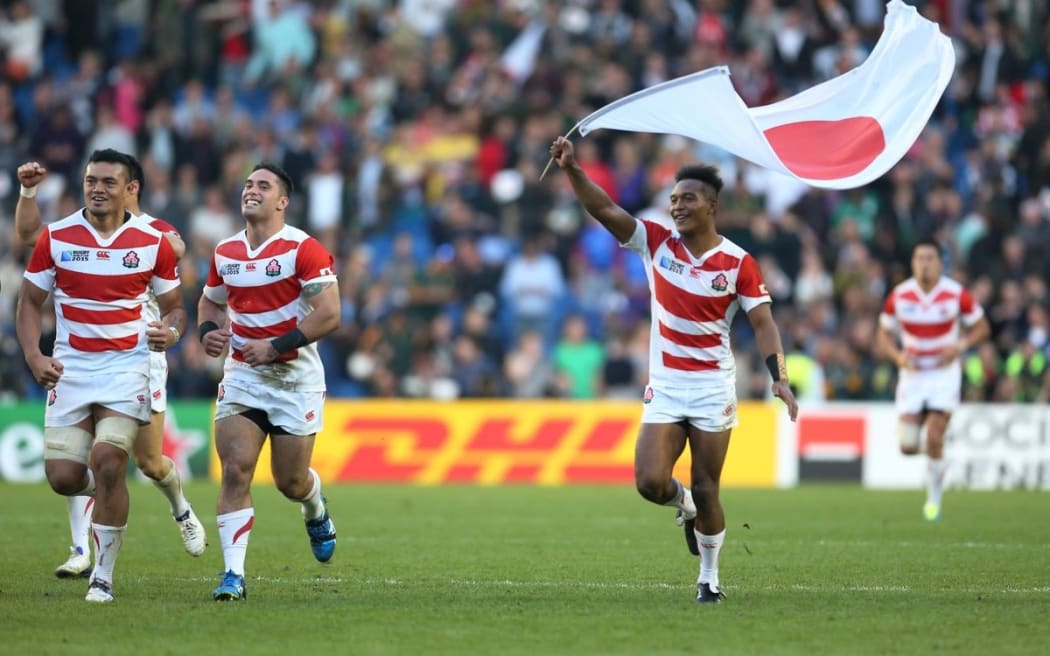Ahead of Japan's bid to beat a second major nation at the Rugby World Cup when they play Scotland overnight, here are five rugby and historical links between the two nations.

Photo: PHOTOSPORT
Scots bring rugby to Japan
Scotland is credited with introducing rugby to Japan. For many it was believed that rugby was first played in Japan in 1899. However, research by Japan rugby historian Mike Galbraith revealed that two Scots, Lord Walter Kerr, who was to become Britain's senior naval officer, and George Hamilton, who was educated at Rugby School in England, had played pivotal roles in bringing rugby to the country in the 1860s at Yokohama Football Club.
Pipes music to the ears of Japanese
Japanese rugby fans at Gloucester for the World Cup match may sympathise with Scottish counterparts angry at a ban on bagpipes for security reasons. The Highland Games are held every year in Japan with the Tokyo Pipe Band - formed in 1974 for the visit of Queen Elizabeth II - providing a musical backdrop. the Tokyo Pipe Band have to practice in office car parks because of the noise.
Scotland unbeaten
Scotland have played Japan four times and won them all. The last time, in 2013, Scotland, won 42-17. In 2004, at the St Johnstone football ground Scotland beat Japan by a record 100-8.

Scotland rugby coach Vern Cotter Photo: PHOTOSPORT
Scots who left their mark on Japanese history
Dr Henry Faulds went to Japan as a Presbyterian missionary surgeon in 1873. He contributed to the medical benefit of Japan but it was in 1880 in the arena of finger printing that he left a lasting impression. Faulds was convinced that everyone's fingertips were unique and got an early chance to prove the theory when there was a break-in at his clinic and through his method of recording fingerprints with ink he prevented the Japanese police from arresting the wrong man. Businessman Thomas Glover known as the 'Scottish Samurai', made a fortune in Japan in the 19th century and built Glover House, the oldest western building in the country, and its historic gardens in Nagasaki. Some say it is the setting for Puccini's famed romantic opera Madame Butterfly and that his Japanese wife Tsuru was the model for Cho-Cho san, the woman who had a child with a Westerner and was abandoned. Tsuru's family family crest was a butterfly. As ever with these tales there is much debate over the truth.
Whisky bonds
Both nations share a love of Scotland's most popular product, whisky. However, in recent years the Japanese have taken a liking to making their own. Indeed a Japanese single malt was named the world's best whisky in November last year and rather like the 'Brave Blossoms' win over South Africa the triumph was labelled a 'wake up call' for Scottish distillers. None of this might have been possible but for a Scottish woman, Jessie Roberta Taketsuru (nee Cowan), better known as Rita. She moved to Japan with her Japanese husband in the 1920s and he set up a distillery at Yoichi on Hokkaido island. After some hard years, it developed into a major whisky player. "Rita played a very important role in Masataka's life work," Japanese distillery executive Emiko Kaji told the BBC. "She provided not only moral support but also financial support when they had a difficult time." She died in 1961.
-AFP





